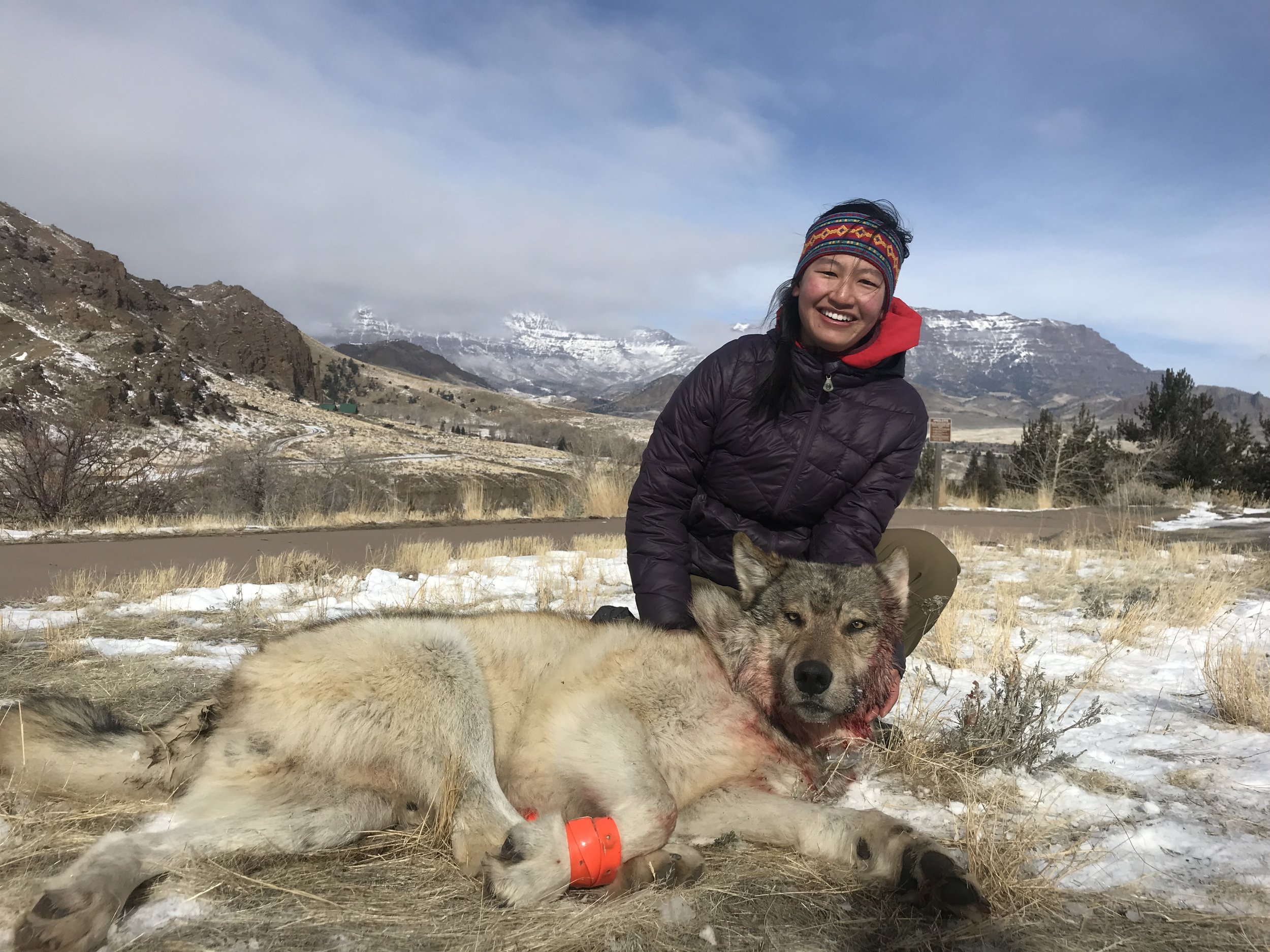My pups and I in my study area in the Absaroka Mountains outside of Cody, Wyoming.
Pictured with Ginger in the Thorofare of the Shoshone National Forest on Day 2 of our ride into an area where we checked wolf kill sites and collected scats at wolf rendezvous sites. (Photo: April Wood)
Working with Wyoming Game and Fish Department and Native Range capture crew, we captured and deployed GPS collars on wolves in our study area during the winters of 2019, 2020, and 2021. Here is a picture of me with a sedated wolf in Feb 2019 at the start of the first winter field season of my PhD.
Avery Shawler
I am an interdisciplinary wildlife ecologist with expertise in the ecological and social dimensions of wolf-livestock conflict and am currently the Science & Research Coordinator at Western Landowners Alliance and work on projects in Oregon as well as across the West.
I did a PhD at the University of California Berkeley in the Department of Environmental Science, Policy, and Management and was a member of Arthur Middleton's lab. My PhD focused on the ecological and social dimensions of wolf-livestock conflict in the eastern region of the Greater Yellowstone Ecosystem near Cody, Wyoming. I am versed in both ecological and qualitative research methods and have used a wide range of data collection methods and analyses, including working extensively with animal movement data from wolf and elk GPS collars to assess predator-prey interactions, leading 6 field seasons of following wolves to investigate predation and prey composition patterns, and conducting semi-structured interviews to evaluate the socioeconomic barriers of managing and mitigating carnivore-livestock conflict. For more information on my PhD research, please see my Research page or refer to my dissertation.
I am passionate about using my academic and working background to connect researchers and practitioners as well as helping bridge the rural-urban divide by increasing understanding between diverse groups. My career has been focused on wolf-livestock conflict on working landscapes in the Northern Rockies where there are a lot of disagreements about land use and wildlife conservation - especially when it comes to wolves. I’ve had the incredible opportunity to work with folks from diverse backgrounds in the “radical center” to work towards a common goal with respect and empathy. I am proud to be part of the Conflict Reduction Consortium (CRC), a collaborative of ranchers, wildlife managers, scientists, and NGOs working towards reducing human-wildlife conflict on working landscapes. I serve on the social issues subcommittee where we have worked on a range of projects - from creating a document on commonly used terms in the carnivore-livestock conflict space to facilitate shared learning across the urban-rural divide, to employing storytelling to foster connection with our Humans of the Working Wild media campaign (inspired by the Humans of New York project). For more CRC resources, check out the Learning Materials page or the CRC website!
A little bit about my background:
I grew up moving around the southeastern US (North Carolina, Georgia, Florida), as well as across the world (Germany, China, Singapore, South Korea), but spent my childhood summers in the Great Smoky Mountains of western North Carolina. I earned a joint degree in Biology and Environmental Studies (Conservation Biology) from Middlebury College in Vermont. After college I had the opportunity to work numerous seasonal field positions across the Western US (Colorado, Arizona, Idaho, California), where I not only learned a variety of fieldwork techniques, but also the challenges of conservation work in mixed-use landscapes. Before starting grad school in 2017, I was working as an independent contractor in Ketchum, Idaho with several conservation nonprofits including the Idaho Conservation League, Central Idaho Rangelands Network, and The Nature Conservancy. I also served as the Project Coordinator for the Wood River Wolf Project, a collaborative of ranchers, wildlife managers, scientists and NGOs working to promote the use of nonlethal tool to prevent wolves from killing sheep. This was my first introduction to wolf-livestock conflict and I was immediately drawn to this work because it brought people with diverse backgrounds together to work towards a common goal. This led me to search for grad school opportunities where I could conduct research to better our understanding of the drivers and challenges of wolf-livestock conflict. I decided to pursue a PhD so that I could be better positioned to connect scientists with people implementing on-the-ground initiatives. For more information on my work and educational experiences, please refer to my CV.
In my free time I love getting outside as much as possible, whether it’s hiking, camping, mountain biking, fly fishing, hunting, backcountry skiing, trail running or even just taking my dogs out for a walk. I also enjoy cooking with my partner and sharing food with friends!


